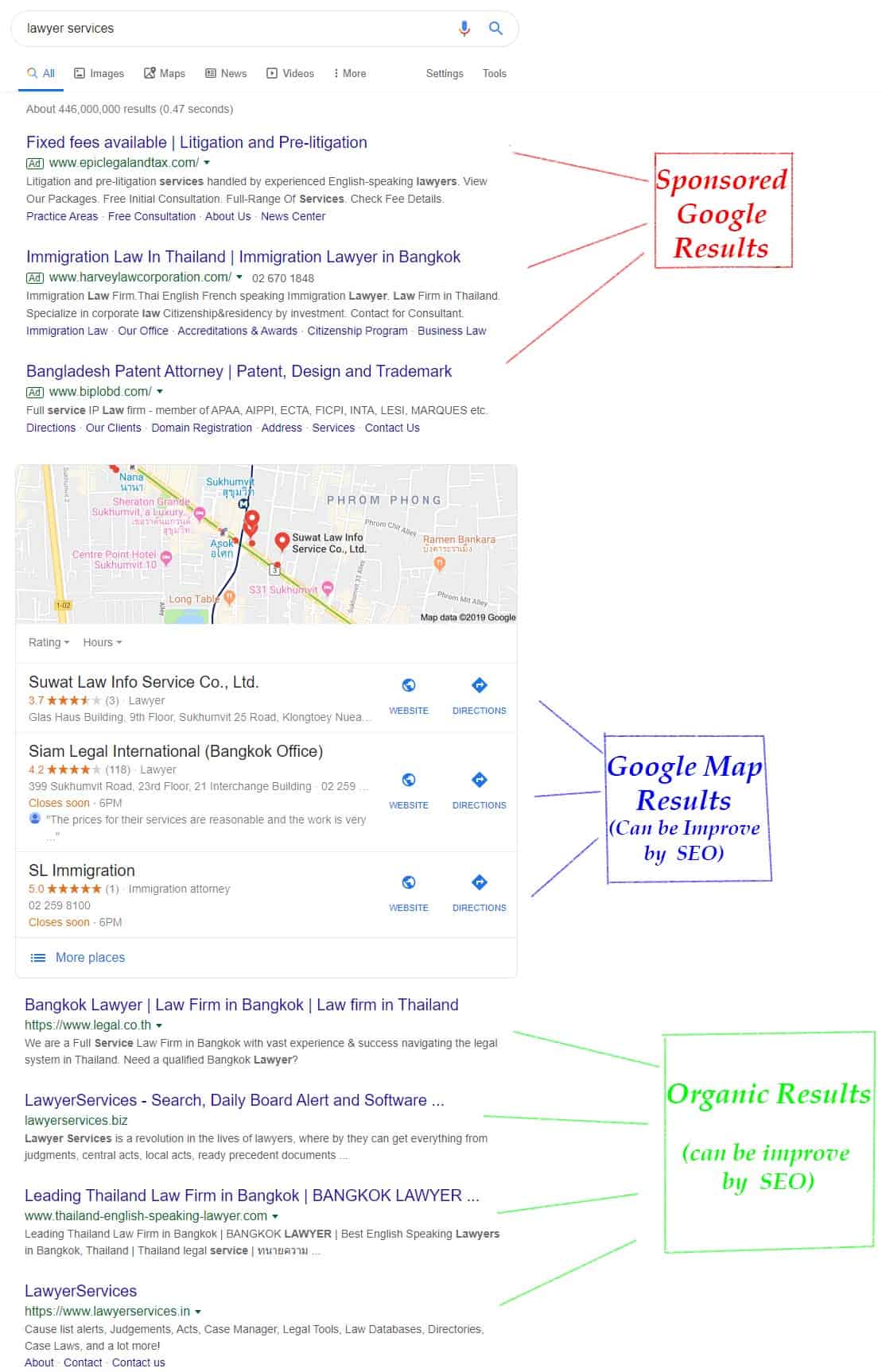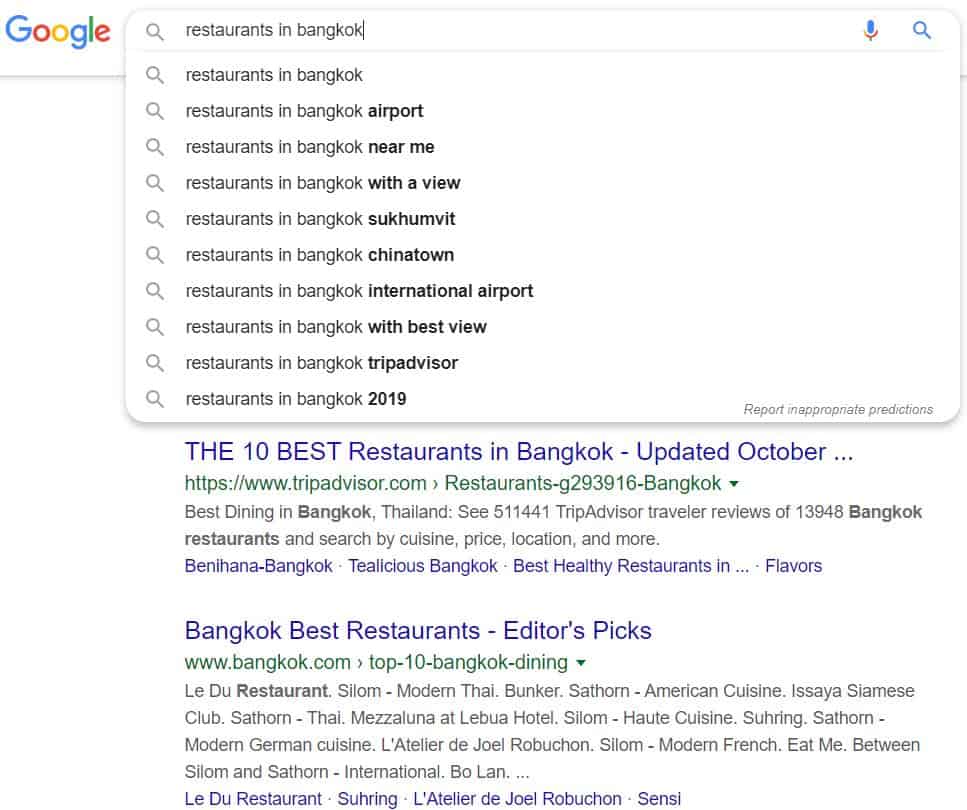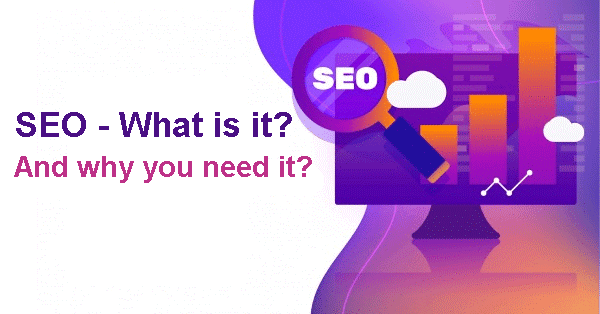Google is trying to confuse us
The first thing to know is that there are two types of search results: The first type of results are the organic results which are the “natural” results in which Google ranks the sites according to their relevance. These results can be (yes!) Influenced by a process known as SEO, the acronym for Search Engine Optimization.
Apart from these search results there are also sponsored results. Sponsored results are results that are specifically related to a specific advertiser who pays money directly to Google to appear in these search results. This process is called Google Adwords or Google Ads.

Organic and sponsored Google results
Although Google Ads results are also based on search ad matching, the question of who will appear first and on the first page is related to a large number of parameters, including the historical performance of the advertiser’s ads and how much they are willing to pay for each click.
And why is this separation so important for website marketing?
The simple answer is that today Google is making a lot of effort to blur the difference between organic and sponsored results in textual format. The next time you search for something like “Taxi Service” you’ll notice that the sponsored ads have a small “Ad” sign underneath them. In the past, these ads were of different background colors and also appeared on side of the page.
What is the bottom line of all this?
If you once thought you were only competing with nine more results on the first page, today you are competing with another 1-7 ads and therefore the competition is tougher (assuming you manage to reach the first page).
On the mobile, things are a little different because there is no page breakdown, but the principle is the same.
As mentioned, today Facebook advertising is the biggest threat to Google, both on the organic level (page posts) and in advertising (all those advertisements that get stuck in our Facebook feed).

Google Autocomplete
However, Google has several key benefits:
- Facebook’s organic advertising is much weaker and much less effective than before: Today’s exposure to organic content that doesn’t pay Facebook to publish them is in a steep decline, much more than the harm to Google’s organic results since the changes mentioned above. For a Facebook post to reach many users, it needs to be shared several times in several groups or pages.
- Market research is done on Google: If a user wants to buy a specific product, search for information, service or a professional, he is likely to search on Google and be more willing to buy or use the service that he’s searching for.
- Vertical Search: Google can do specific searches like products, videos, photos and recently flights too, not to mention local maps and businesses that appear in regular search in a prominent place. Facebook has a kind of vertical search that appears in the general search but is less significant and not similar to Google’s (on Facebook we search for groups or posts of friends and not necessarily pictures). In the past, some very interesting search options could be done on Facebook, but since all the privacy issues, most of them no longer relevant.
Also, it is important to emphasize a significant difference between these 2 advertising monsters:
- Facebook = Push Marketing – which simply means “pushing” your product/service to a specific target audience.
- Google = Pull Marketing – advertising / promoting to a target audience who searched for your product/service.
In many cases and some areas, Push Marketing is almost irrelevant: for example, in emergency services (locksmith, rescue, battery replacement, device repair, etc.) the overwhelming majority of people will look for professionals on Google rather than Facebook.
In contrast, Pull Marketing is relevant to 99.9% of businesses.
How does organic search work?
So far the theoretical part, but how does SEO work?
As of today, Google is currently looking mainly at the textual sections of the site. We can give it a brief description of photos or videos, but it can’t go into the smallest detail of what’s in them.
- Keywords – The basis of the SEO process
One of the first things to do before deciding to promote a site is to understand what the user in our target audience might be looking for. These searches are also called “keywords” and in fact, each keyword is a phrase that can be made up of several words.
This process is called keyword research and there are quite a few tools that help us do it.
Once you have a list of keywords, you can build the content around them.
However, it is important to remember that you should not stick too closely to exactly the same keywords, should use also similar or synonymous phrases.
This is because the user may search for slightly different keywords, compose a few keywords, or enter an entirely new one. All of these create unique searches that Google can process and understand its meaning.
We can see many of the different variations of searches through a Google tool called Search Console and provide lots of interesting insights about our site and its exposure to Google.
By the way, when choosing keywords, it is important to understand what the user intends to know if we are worth promoting this word. For example, if I promote a mortgage advisor site, the phrase “reverse mortgage” might not be relevant to me because I’m not looking for that target audience.
Even if I get a lot of traffic from that phrase, it will not turn itself in inquiries so it is a pity that I waste my time on it.
- Content
From what is written above, it is easy to understand that content marketing strategy on the site is still the most important thing today on the site and it is the one that will invest the most energy, especially if we started promoting a new website that did not have much content or that the content that was low level (any SEO Person knows that Content is King).
Aside from the content within the page (including the headlines), Google also draws information from the page’s title and description, which is basically what people usually see in the search results (although Google may also take other sections from those we recommend based on what the user is looking for).
On the above, we will influence a process called Optimization or On-site SEO.
When writing the content, the keywords must also be related, but logically without creating a text that looks like a grocery list.
In the end, we want the user to want to read the content and take what we offer him. In other words, the text is first and foremost for the user and only after for Google.
- Hierarchy
Beyond the content, the structure of the site is also important. If Google used to look primarily at individual pages, today it also judges each page by the other pages on the site: how many pages link to it, what part of the site it is on, what other pages it links to, and so on.
The correct hierarchy is a hierarchy where each page has links from other pages that link to it logically. For example, links from an article that explain specific concepts, a link to similar guides, and so on. Incidentally, links from menus also create a hierarchy, so the menus must be clear and not too cluttered.
If we zoom out for a moment, you can say that hierarchy is related to both website design and user experience design (UX).
- Links from other sites
Most organic promotion campaigns also include links from other sites (also called external links or backlinks), and this is probably the first thing you’ve been told if you’ve ever contacted an SEO company that tried to convince you that they are the best in the market.
There are SEO companies that promise to get you a lot of links, but it’s important to know that not all links are the same. Google can identify link quality by quite a few parameters. For example:
* The rankings of the linking site on Google.
* Is it a spam site (you probably won’t want to get links from such a site although there are quite a few who do it to get quick but dangerous results in the long run).
* Is there a strong logical relationship in terms of content between the linking page and the linked page.
* What is written in the link itself (the link text is also called “Anchor” or Anchor Text). Most of the links that you want to get include at least one keyword or part of it. For example, a link to this article may be “Beginner SEO Guide”.
* The position of the link within the page.
* And more…
Incidentally, Google theoretically favors links that we didn’t create ourselves, but in fact, only a fraction of sites can and do get them regularly.
To increase the chances that we will still receive them, we need to create pages that will attract others to connect with us through attractive content and social networking.
- Technical Aspects
With so many devices from which we connect to the Internet and websites that provide different browsing experiences (from news to shopping), Google must also consider the performance of the site and not just its relevance.
Currently, the three most important metrics are the degree of mobile-friendly (whether the site is easy to use and has no hard-to-access parts of the mobile), speed (preferably loading time in less than five seconds), and security (whether the information from the site is encrypted and back).
For each one of those, you can write a full guide, but the bottom line is that the company through which you have built the site should work closely with your website promoter to get optimal results.
Who ends up doing the SEO work?
The principles I have presented here are intended to provide background on the SEO world.
In practice, things are not easy and even Google admits that it has hundreds of different site ranking parameters that are constantly changing.
So, although you can promote your site yourself, once your site grows to a certain volume, you should let a professional SEO specialist person or a digital marketing agency to do it professionally for you.
The money you spend on the promotion will be worth you all the time you can turn to manage your business or website, and of course the sales and leads you will receive.
Good Luck! And if you need SEO Services or want to consult on the topic – we at SEO Bangkok we’d love to help

